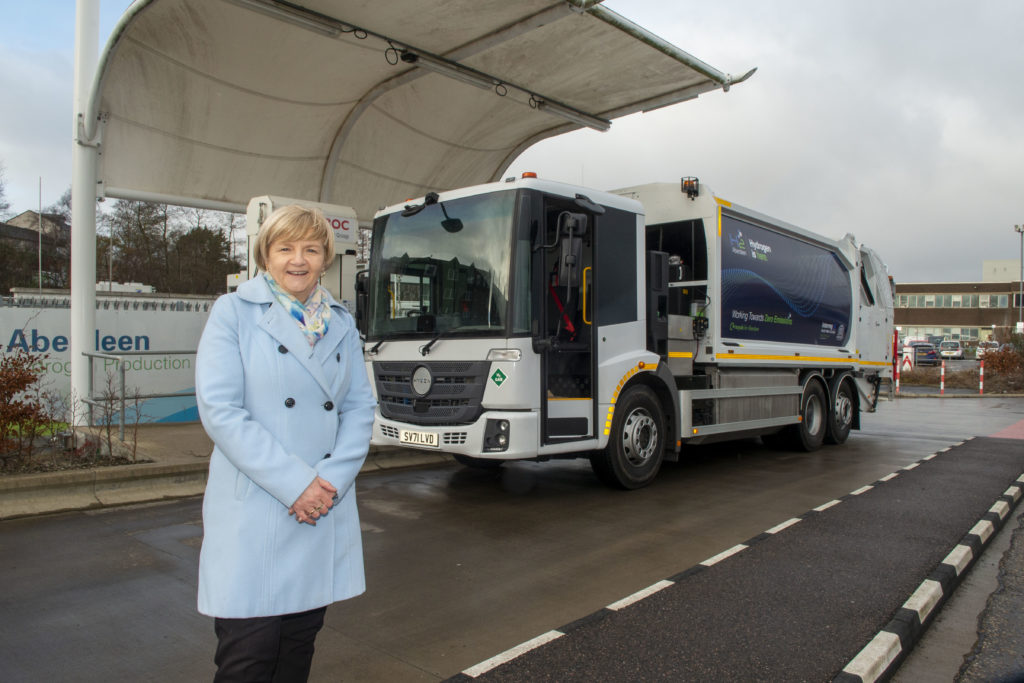The RCV will run on hydrogen created by hydrolysis at Aberdeen’s two refuelling stations and will begin collecting waste from around the city from early March.
Manufactured and supplied to Aberdeen via European waste vehicle manufacturer Geesinknorba at an undisclosed cost, the RCV is one of seven which will be deployed across seven pilot sites in northwest Europe, including the Netherlands, France, Belgium, and Germany.
The council says the RCV’s proposed route in Aberdeen will result in an estimated saving of more than 2.5kg* of CO2 equivalents per litre when compared to a diesel truck.
The truck will also collect data to improve the roll-out of more hydrogen-fuelled RCVs in the future.
Councillor Jenny Laing, Aberdeen city council’s leader, said: “Enabling truly ‘green’ transport is a key deliverable in our plan to deliver Aberdeen’s Net Zero Vision and our own plans to replace our vehicle fleet with alternative fuelled vehicles.
“Adding a waste truck powered only by hydrogen is another important step forward and builds on the zero emission buses and other public sector vehicles that are already here in the city.”
HECTOR
Interreg North-West Europe, a programme funded by the European Commission which aims to make North-West Europe a “key economic player” and an “attractive place to work and live”, has part-funded Aberdeen’s purchase of the vehicle.
The programme has provided funding for the seven RCVs across Europe as part of its Hydrogen Waste Collection Vehicles in North-West Europe (HECTOR) project.
Each RCV will be tested in a range of environments, from rural areas to city centres, in an attempt to demonstrate that hydrogen waste trucks are “effective” at reducing emissions from road transport.
Selected as the project’s lead partner, Aberdeen city council will add the RCV to its fleet of 85 hydrogen-powered commercial vehicles, which includes buses and public sector vehicles.
Each European deployment site will aim to continue operation of the RCVs after the end of the project in June 2023 and will gradually replace conventionally fuelled trucks with other hydrogen-powered vehicles.
Route
Aberdeen’s RCV will initially collect wheeled bins in Garthdee, Kincorth, Bridge of Don, Newhills, Woodside/Hilton, Mastrick, Milltimber, and Rubislaw before moving to mixed recycling and bulk bins on other routes, the council says.
The people of Aberdeen can be proud that our city is proving to be a catalyst for demonstrating how public sector fleet can be decarbonised
- Cllr Ryan Houghton, Aberdeen city council’s city growth and resources convener
Its chassis was manufactured by Hyzon Motors, a global supplier of hydrogen fuel cell-powered commercial vehicles.
Cllr Ryan Houghton, Aberdeen city council’s city growth and resources convener, said: “Our work has been ground-breaking, and the people of Aberdeen can be proud that our city is proving to be a catalyst for demonstrating how public sector fleet can be decarbonised, setting an example for other regions in the UK and beyond.
“The launch of the new waste truck comes hot on the heels of the new joint venture company with bp to deliver the Aberdeen Hydrogen Hub, and all of these projects cement our position as a pioneering, climate positive city and an important step forward in our hydrogen journey.”
Aberdeen
Representing an estimated population of nearly 230,000, Aberdeen city council had a household waste recycling rate of 45.6% in 2020.

The council delivers waste collection in-house on an alternative weekly basis, where one week it collects residual waste and the next mixed recycling.
There are currently 65 waste vehicles in Aberdeen’s fleet.
While Aberdeen claims to be the first council in the UK to put its hydrogen fuel cell RCV into operation, other local authorities have plans in the works.
St Helens council in Merseyside recently announced that it had ordered 10 Faun Bluepower hydrogen-powered RCVs from waste vehicle manufacturer FAUN-Zoeller UK.
[Story updated 27.5.22 to reflect that using the vehicles will result in estimated emissions savings of over 2.5kg CO2e/litre, not 25kg CO2e/litre as Aberdeen originally stated.]












Subscribe for free